Abstract
Preliminary studies established methods for obtaining maximum yields of viable cells. Liquid shaken cultures of Histoplasma capsulatum provided a maximum of 4 × 108 to 5 × 108 cells/ml regardless of the inoculum size. Under optimum conditions, cells were viable (90 to 95%) for 168 to 240 hr. Generation times ranged from 7.52 to 8.36 hr. Immunodiffusion, immunoelectrophoresis, and ultracentrifugation studies on phenol and ethylenediamine extracts of intact cells and cell walls revealed the presence of two components in the ethylenediamine extracts and three in the phenol preparations. The ethylenediamine extracts from intact cells and cell walls seemed to be identical although one of the components was more abundant in cell walls. Mice injected intraperitoneally with intact cells or cell walls were protected against intravenous challenge with H. capsulatum. Among the extracts, the water-soluble ethylenediamine extract from cell walls was most immunogenic. The other extracts gave only a light protection or none at all. Intact cells and cell walls were slightly toxic to mice. Two of the extracts were toxic when incorporated into Freund's complete adjuvant.
Full text
PDF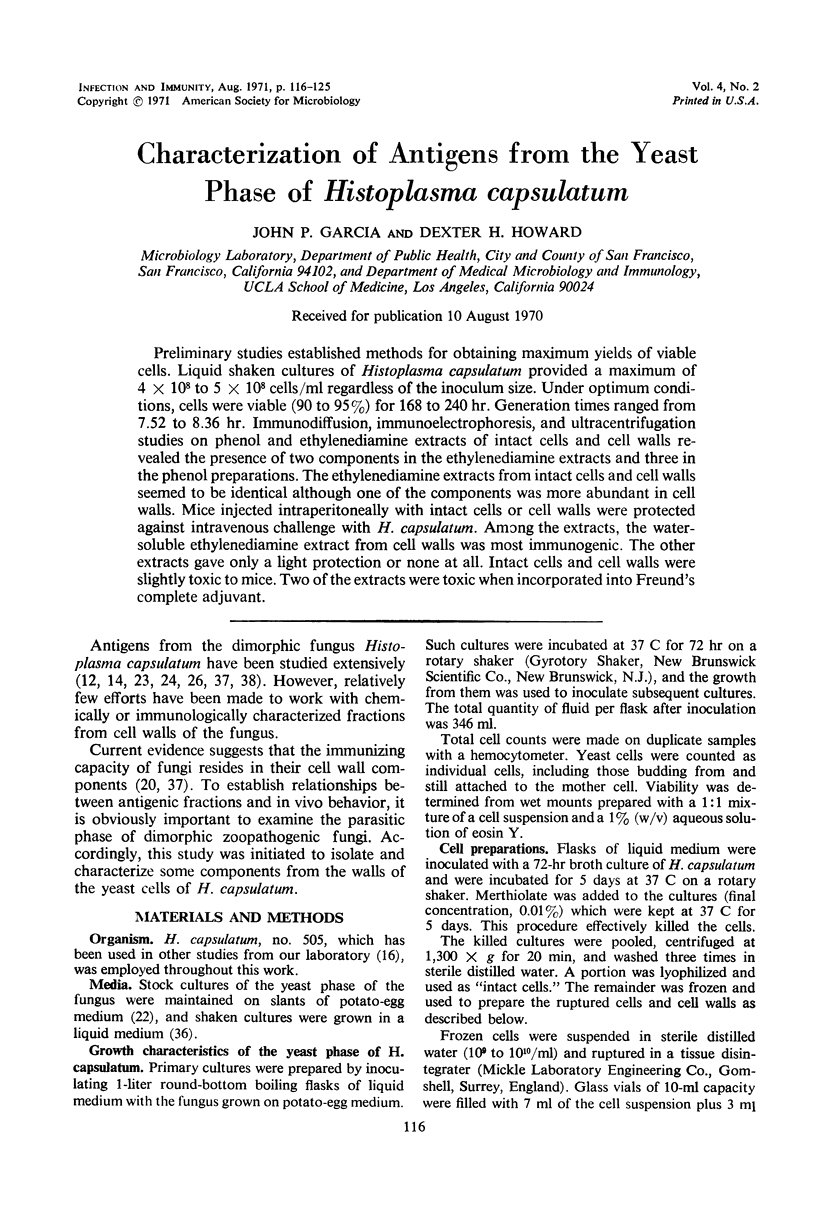
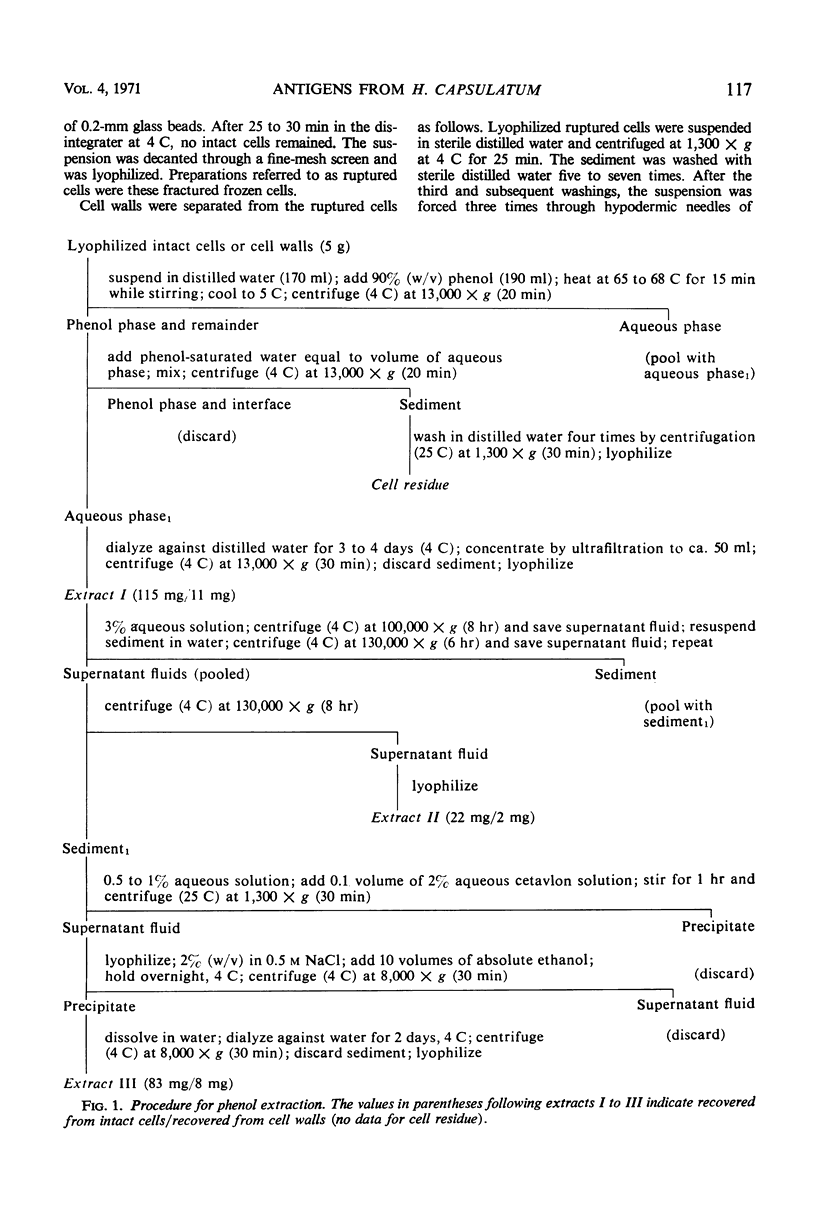
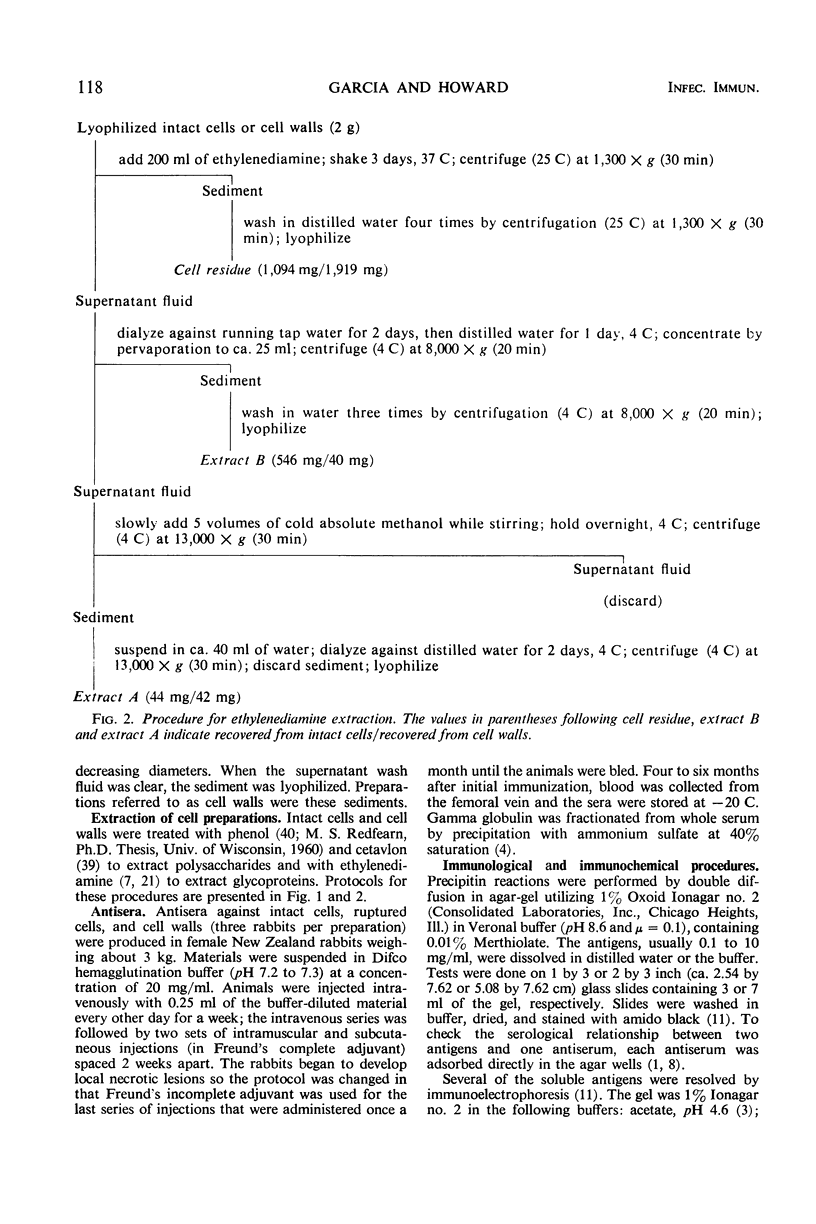
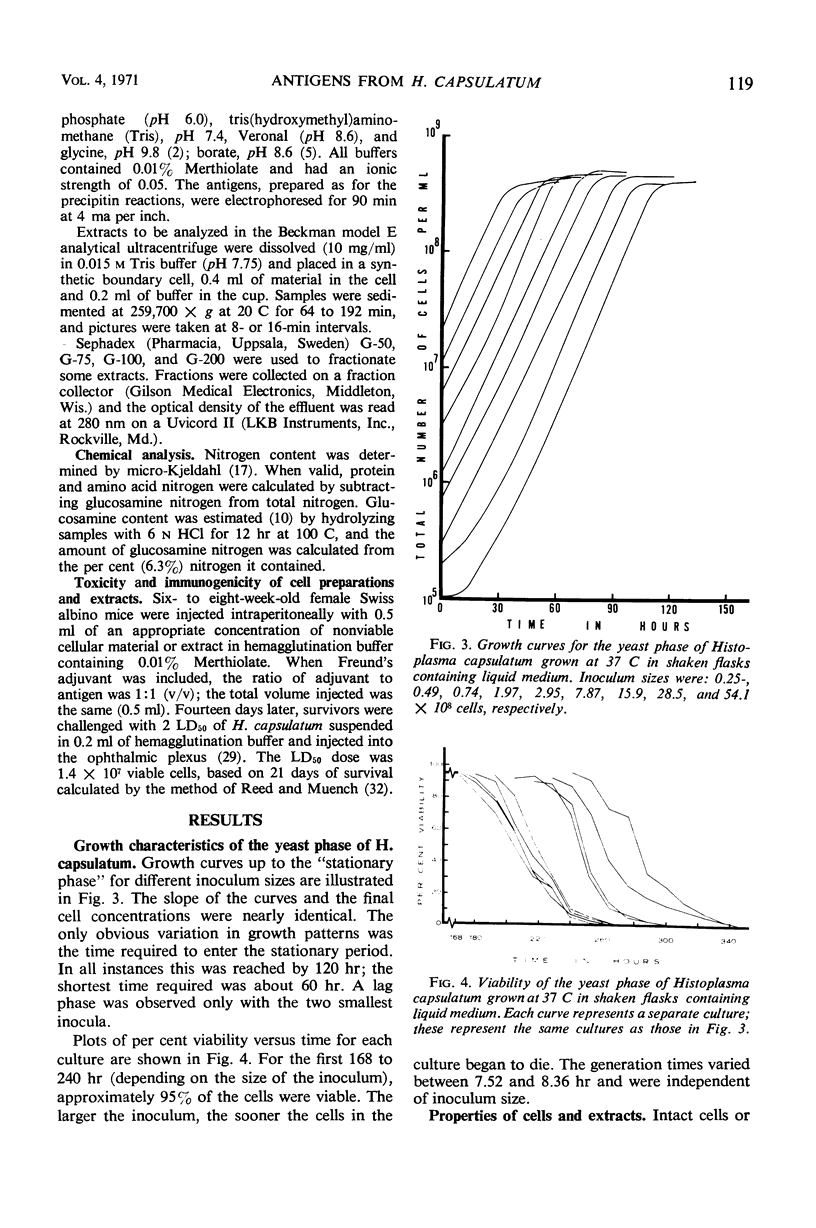
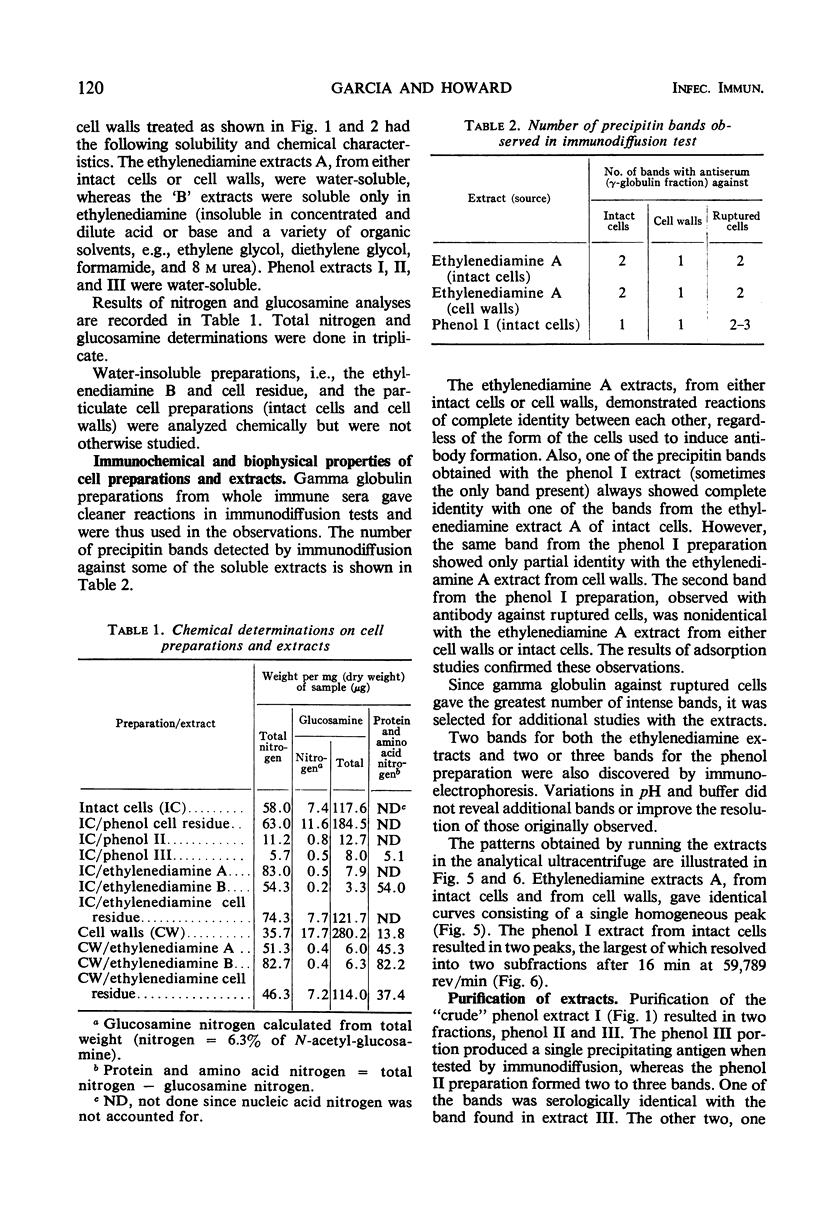
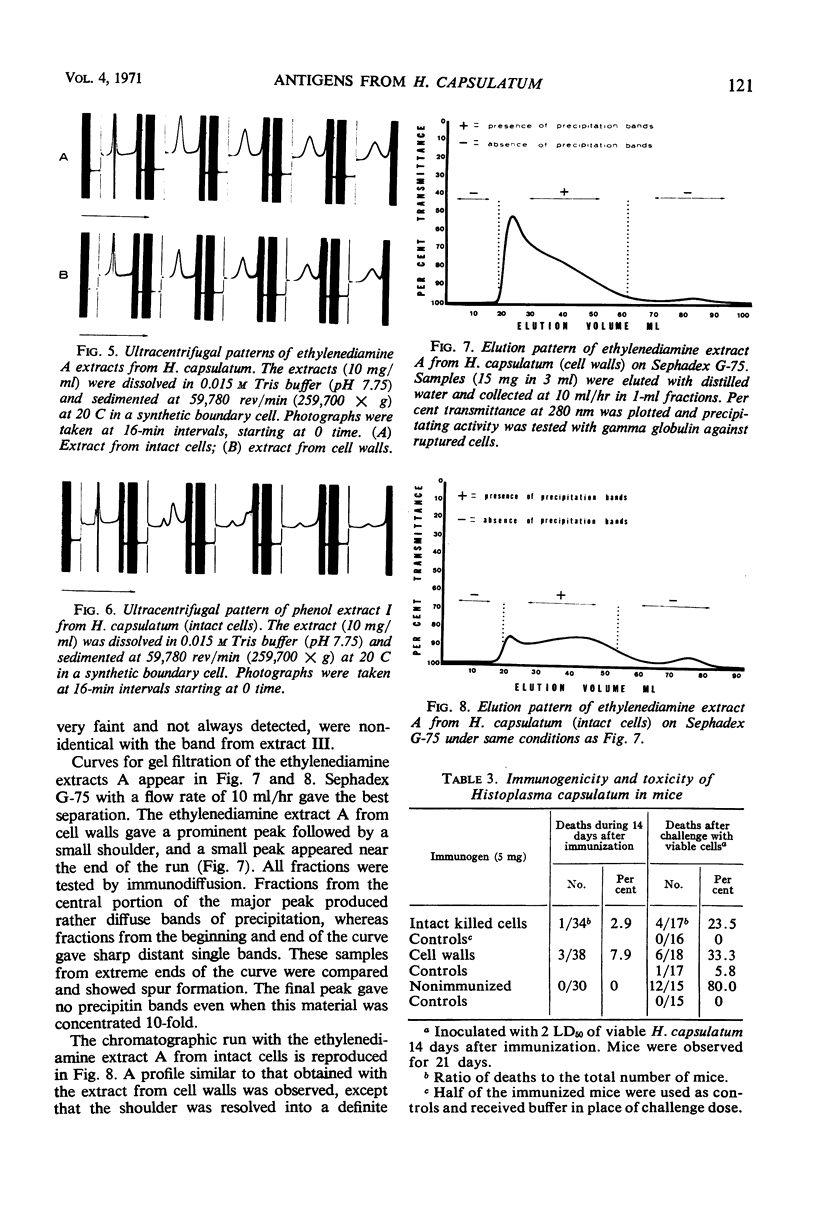
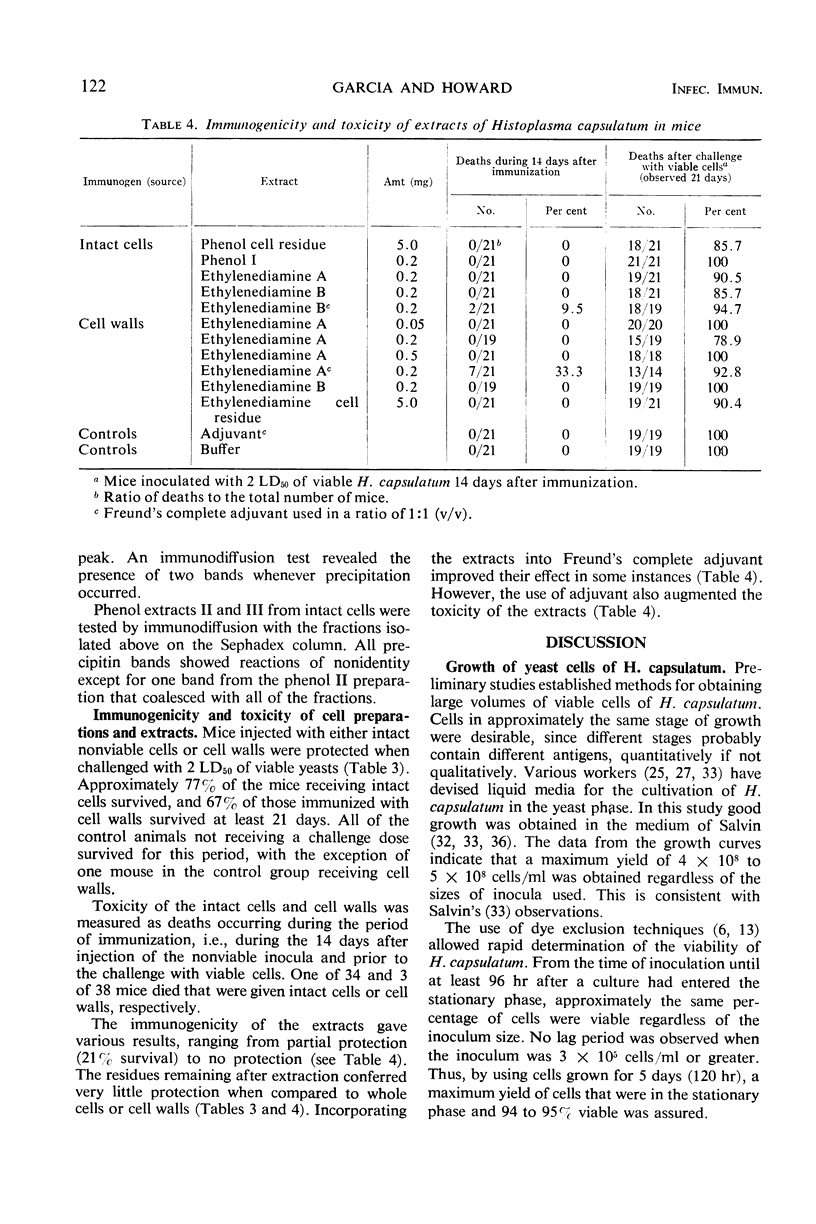
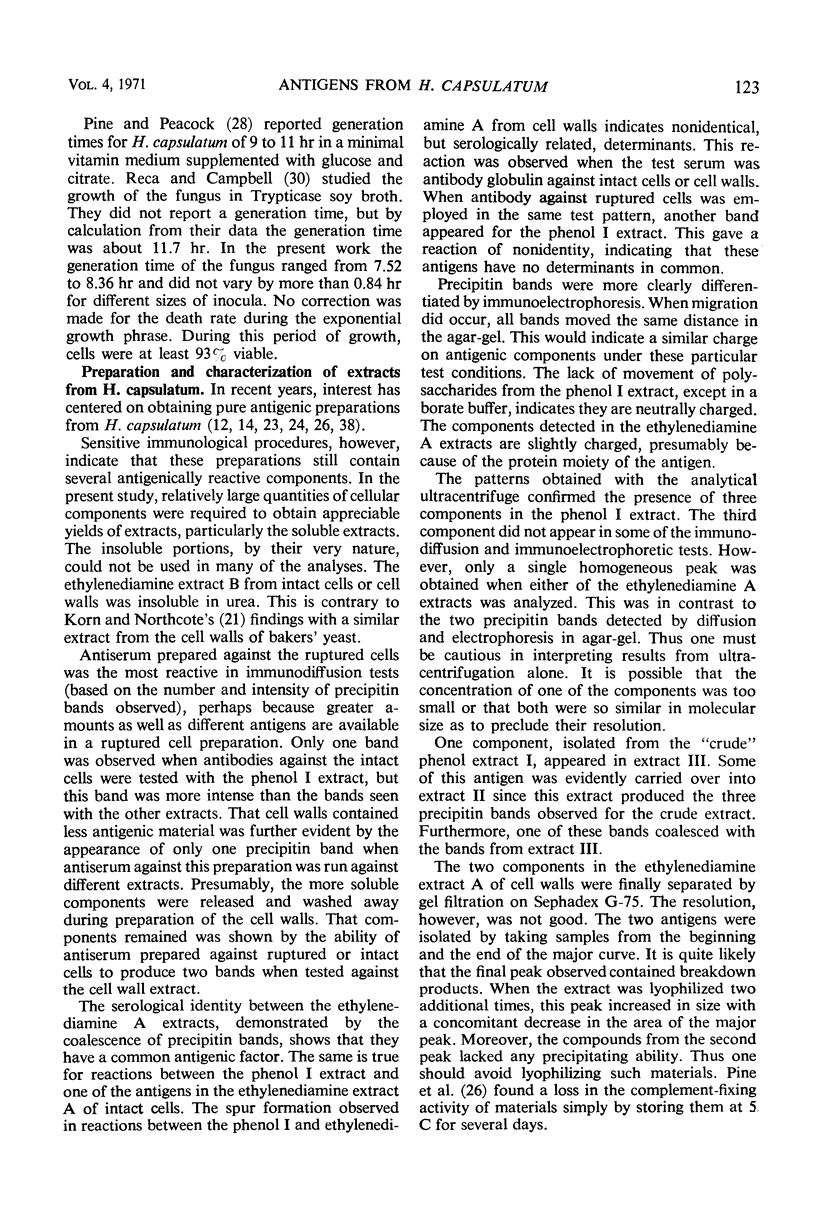
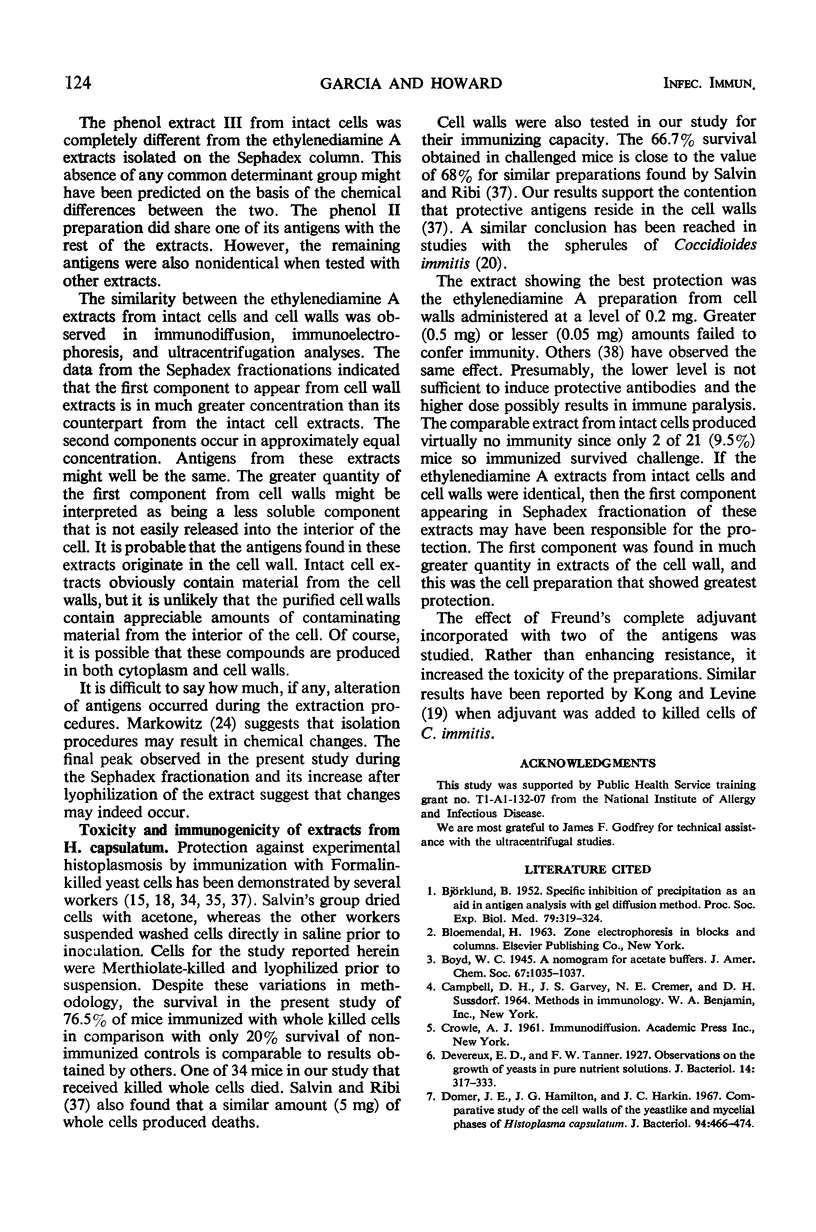
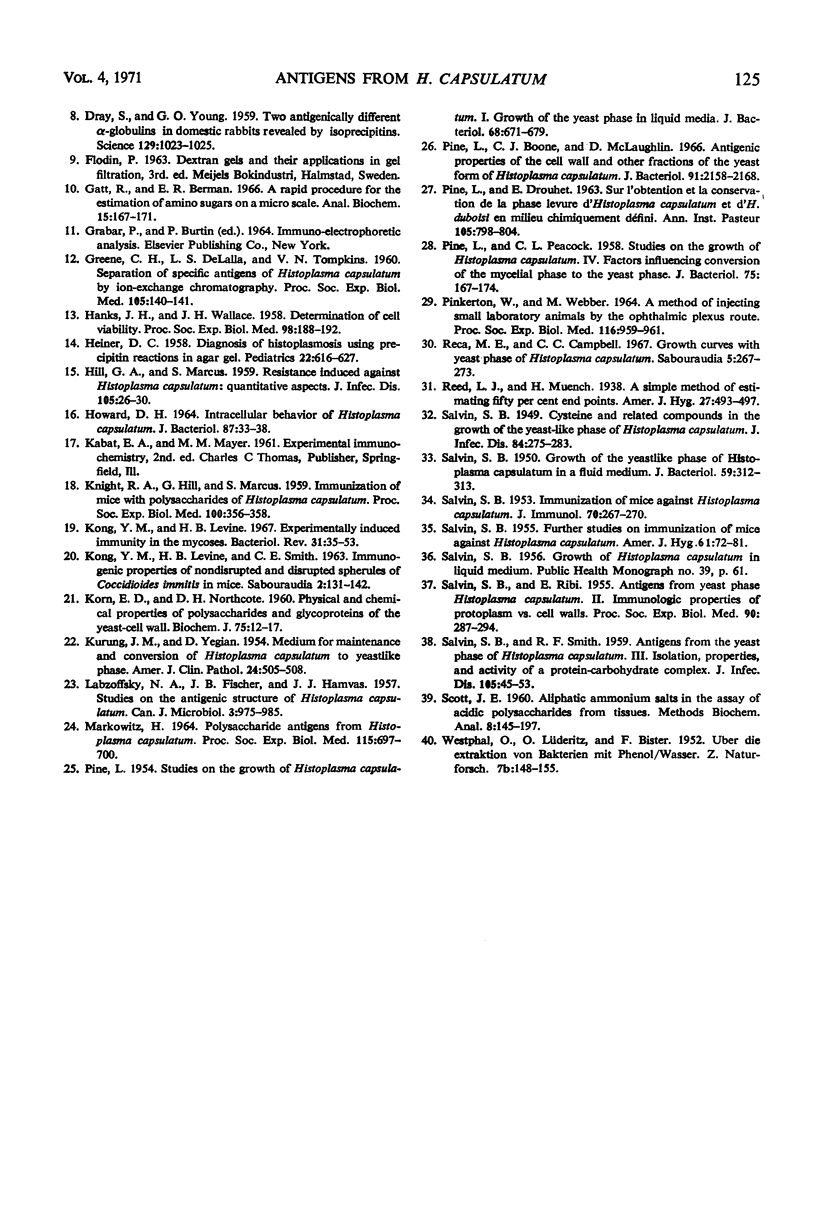
Selected References
These references are in PubMed. This may not be the complete list of references from this article.
- BJORKLUND B. Specific inhibition of precipitation as an aid in antigen analysis with gel diffusion method. Proc Soc Exp Biol Med. 1952 Feb;79(2):319–324. doi: 10.3181/00379727-79-19364. [DOI] [PubMed] [Google Scholar]
- DRAY S., YOUNG G. O. Two antigenically different gamma-globulins in domestic rabbits revealed by isoprecipitins. Science. 1959 Apr 17;129(3355):1023–1025. doi: 10.1126/science.129.3355.1023. [DOI] [PubMed] [Google Scholar]
- Devereux E. D., Tanner F. W. OBSERVATIONS ON THE GROWTH OF YEASTS IN PURE NUTRIENT SOLUTIONS. J Bacteriol. 1927 Nov;14(5):317–333. doi: 10.1128/jb.14.5.317-333.1927. [DOI] [PMC free article] [PubMed] [Google Scholar]
- Domer J. E., Hamilton J. G., Harkin J. C. Comparative study of the cell walls of the yeastlike and mycelial phases of Histoplasma capsulatum. J Bacteriol. 1967 Aug;94(2):466–474. doi: 10.1128/jb.94.2.466-474.1967. [DOI] [PMC free article] [PubMed] [Google Scholar]
- GREENE C. H., DELALLA L. S., TOMPKINS V. N. Separation of specific antigens of Histoplasma capsulatum by ion-exchange chromatography. Proc Soc Exp Biol Med. 1960 Oct;105:140–141. doi: 10.3181/00379727-105-26037. [DOI] [PubMed] [Google Scholar]
- Gatt R., Berman E. R. A rapid procedure for the estimation of amino sugars on a micro scale. Anal Biochem. 1966 Apr;15(1):167–171. doi: 10.1016/0003-2697(66)90262-4. [DOI] [PubMed] [Google Scholar]
- HANKS J. H., WALLACE J. H. Determination of cell viability. Proc Soc Exp Biol Med. 1958 May;98(1):188–192. doi: 10.3181/00379727-98-23985. [DOI] [PubMed] [Google Scholar]
- HEINER D. C. Diagnosis of histoplasmosis using precipitin reactions in agargel. Pediatrics. 1958 Oct;22(4 Pt 1):616–627. [PubMed] [Google Scholar]
- HILL G. A., MARCUS S. Resistance induced against Histoplasma capsulatum; quantitative aspects. J Infect Dis. 1959 Jul-Aug;105(1):26–30. doi: 10.1093/infdis/105.1.26. [DOI] [PubMed] [Google Scholar]
- HOWARD D. H. INTRACELLULAR BEHAVIOR OF HISTOPLASMA CAPSULATUM. J Bacteriol. 1964 Jan;87:33–38. doi: 10.1128/jb.87.1.33-38.1964. [DOI] [PMC free article] [PubMed] [Google Scholar]
- KNIGHT R. A., HILL G., MARCUS S. Immunization of mice with polysaccharides of Histoplasma capsulatum. Proc Soc Exp Biol Med. 1959 Feb;100(2):356–358. doi: 10.3181/00379727-100-24625. [DOI] [PubMed] [Google Scholar]
- KONG Y. C., LEVINE H. B., SMITH C. E. Immunogenic properties of nondisrupted and disrupted spherules of Coccidioides immitis in mice. Sabouraudia. 1963 Feb;2:131–142. [PubMed] [Google Scholar]
- KORN E. D., NORTHCOTE D. H. Physical and chemical properties of polysaccharides and glycoproteins of the yeast-cell wall. Biochem J. 1960 Apr;75:12–17. doi: 10.1042/bj0750012. [DOI] [PMC free article] [PubMed] [Google Scholar]
- KURUNG J. M., YEGIAN D. Medium for maintenance and conversion of Histoplasma capsulatum to yeast like phase. Am J Clin Pathol. 1954 Apr;24(4):505–508. doi: 10.1093/ajcp/24.4_ts.505. [DOI] [PubMed] [Google Scholar]
- Kong Y. C., Levine H. B. Experimentally induced immunity in the mycoses. Bacteriol Rev. 1967 Mar;31(1):35–53. doi: 10.1128/br.31.1.35-53.1967. [DOI] [PMC free article] [PubMed] [Google Scholar]
- LABZOFFSKY N. A., FISCHER J. B., HAMVAS J. J. Studies on the antigenic structure of Histoplasma capsulatum. Can J Microbiol. 1957 Dec;3(7):975–985. doi: 10.1139/m57-108. [DOI] [PubMed] [Google Scholar]
- MARKOWITZ H. POLYSACCHARIDE ANTIGENS FROM HISTOPLASMA CAPSULATUM. Proc Soc Exp Biol Med. 1964 Mar;115:697–700. doi: 10.3181/00379727-115-29010. [DOI] [PubMed] [Google Scholar]
- PINE L., DROUHET E. SUR L'OBTENTION ET LA CONSERVATION DE LA PHASE LEVURE D'HISTOPLASMA CAPSULATUM ET D'H. DUBOISI EN MILIEU CHIMIQUEMENT D'EFINI. Ann Inst Pasteur (Paris) 1963 Oct;105:798–804. [PubMed] [Google Scholar]
- PINE L., PEACOCK C. L. Studies on the growth of Histoplasma capsulatum. IV. Factors influencing conversion of the mycelial phase to the yeast phase. J Bacteriol. 1958 Feb;75(2):167–174. doi: 10.1128/jb.75.2.167-174.1958. [DOI] [PMC free article] [PubMed] [Google Scholar]
- PINE L. Studies on the growth of Histoplasma capsulatum. I. Growth of the yeast phase in liquid media. J Bacteriol. 1954 Dec;68(6):671–679. doi: 10.1128/jb.68.6.671-679.1954. [DOI] [PMC free article] [PubMed] [Google Scholar]
- PINKERTON W., WEBBER M. A METHOD OF INJECTING SMALL LABORATORY ANIMALS BY THE OPHTHALMIC PLEXUS ROUTE. Proc Soc Exp Biol Med. 1964 Aug-Sep;116:959–961. doi: 10.3181/00379727-116-29420. [DOI] [PubMed] [Google Scholar]
- Pine L., Boone C. J., McLaughlin D. Antigenic properties of the cell wall and other fractions of the yeast form of Histoplasma capsulatum. J Bacteriol. 1966 Jun;91(6):2158–2168. doi: 10.1128/jb.91.6.2158-2168.1966. [DOI] [PMC free article] [PubMed] [Google Scholar]
- SALVIN S. B. Further studies on immunization of mice against Histoplasma capsulatum. Am J Hyg. 1955 Jan;61(1):72–81. doi: 10.1093/oxfordjournals.aje.a119741. [DOI] [PubMed] [Google Scholar]
- SALVIN S. B. Growth of the yeastlike phase of Histoplasma capsulatum in a fluid medium. J Bacteriol. 1950 Feb;59(2):312–313. doi: 10.1128/jb.59.2.312-313.1950. [DOI] [PMC free article] [PubMed] [Google Scholar]
- SALVIN S. B. Immunization of mice against Histoplasma capsulatum. J Immunol. 1953 Mar;70(3):267–270. [PubMed] [Google Scholar]
- SALVIN S. B., RIBI E. Antigens from yeast phase of Histoplasma capsulatum. II. Immunologic properties of protoplasm vs. cell walls. Proc Soc Exp Biol Med. 1955 Oct;90(1):287–294. doi: 10.3181/00379727-90-22012. [DOI] [PubMed] [Google Scholar]
- SALVIN S. B., SMITH R. F. Antigens from the yeast phase of Histoplasma capsulatum. III. Isolation, properties, and activity of a protein-carbohydrate complex. J Infect Dis. 1959 Jul-Aug;105(1):45–53. doi: 10.1093/infdis/105.1.45. [DOI] [PubMed] [Google Scholar]
- SCOTT J. E. Aliphatic ammonium salts in the assay of acidic polysaccharides from tissues. Methods Biochem Anal. 1960;8:145–197. doi: 10.1002/9780470110249.ch4. [DOI] [PubMed] [Google Scholar]


